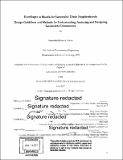| dc.contributor.advisor | Mary Anne Ocampo and Rafi Segal. | en_US |
| dc.contributor.author | Cohen, Samantha Rebecca | en_US |
| dc.contributor.other | Massachusetts Institute of Technology. Department of Urban Studies and Planning. | en_US |
| dc.date.accessioned | 2017-09-15T15:31:37Z | |
| dc.date.available | 2017-09-15T15:31:37Z | |
| dc.date.copyright | 2017 | en_US |
| dc.date.issued | 2017 | en_US |
| dc.identifier.uri | http://hdl.handle.net/1721.1/111380 | |
| dc.description | Thesis: M.C.P., Massachusetts Institute of Technology, Department of Urban Studies and Planning, 2017. | en_US |
| dc.description | Cataloged from PDF version of thesis. | en_US |
| dc.description | Includes bibliographical references (pages 98-101). | en_US |
| dc.description.abstract | Ecovillages, which are grassroots intentional communities focused on the shared values of environmental sustainability and community-building, offer an alternative to traditional development primarily focused on developer profit, which creates incentives to build cheaply with little consideration for sustainability, reducing operating costs, creation of community or innovation in building techniques. The problem with modem development practices is that there is an absence of truly sustainable, community-oriented housing options on the market that are economically empowering, socially just, and which enhance the ecology of place by building all forms of capital-- economic capital, social capital, and environmental capital. Ecovillages provide a solution to this, as well as many other 'wicked' problems our society faces-they are blueprints for how communities can live sustainably. This thesis explores the best practices in ecovillage urban design in urbanized and rural settings to improve the design of current and future ecovillages and to use as a design model communities or designers in building sustainable communities, as urban design is inherently linked to sustainability. Through the creation of a matrix of sustainable urban design strategies, this can be used to compare various ecovillages and sustainable communities to understand and analyze how values are embodied in the physical site design or constrained by urban site conditions, and give a process and design guidelines to designers and communities looking to create sustainable neighborhoods or ecovillages. | en_US |
| dc.description.statementofresponsibility | by Samantha Rebecca Cohen. | en_US |
| dc.format.extent | 111 pages | en_US |
| dc.language.iso | eng | en_US |
| dc.publisher | Massachusetts Institute of Technology | en_US |
| dc.rights | MIT theses are protected by copyright. They may be viewed, downloaded, or printed from this source but further reproduction or distribution in any format is prohibited without written permission. | en_US |
| dc.rights.uri | http://dspace.mit.edu/handle/1721.1/7582 | en_US |
| dc.subject | Urban Studies and Planning. | en_US |
| dc.title | Ecovillages as models for sustainable urban neighborhoods : design guidelines and methods for understanding, analyzing and designing sustainable communities | en_US |
| dc.title.alternative | Design guidelines and methods for understanding, analyzing and designing sustainable communities | en_US |
| dc.type | Thesis | en_US |
| dc.description.degree | M.C.P. | en_US |
| dc.contributor.department | Massachusetts Institute of Technology. Department of Urban Studies and Planning | |
| dc.identifier.oclc | 1003291609 | en_US |
